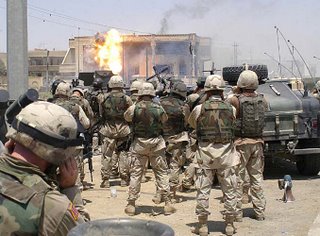
Another day in the sandbox
No Silent Majority for Bush
By E. J. Dionne Jr.
Tuesday, September 26, 2006; Page A21
What could prove to be the most important factor in the 2006 elections is overlooked because it is unseen: The Republicans cannot try to curry favor with a "silent majority" that favors the Iraq war because a majority of Americans, both vocal and quiet, have come to see the war as a mistake.
President Bush's defenders have cast opponents of the war as weak on terrorism. Yesterday, Vice President Cheney accused Democrats of "resignation and defeatism." But the charges have not taken hold, because most Americans don't agree with the premise linking the war on terror with the war in Iraq.
And blame for the failures in Iraq has fallen not on some liberal coterie supposedly holding our generals back but on the choices of civilians in a conservative administration. Those civilians, and their allies outside the administration, find themselves under increasing fire from leaders of the military and the intelligence services for bad planning, flawed analysis and unrealistic expectations.
Moreover, the tone of the opposition to this war is quite different from the tenor of some sections of the movement against the Vietnam War. Reaction to "hippie protesters," as the phrase went, allowed President Richard Nixon to pit a hardworking, patriotic "silent majority" -- it was one of the most politically potent phrases of his presidency -- against the privileged, the young and the media, whom his vice president Spiro Agnew memorably characterized as "effete snobs" and "nattering nabobs of negativism."
As the historian and Nixon biographer Stephen Ambrose noted, tiny minorities -- "they numbered less than 1 percent of the demonstrators," he wrote of a 1969 rally -- "waved Viet Cong flags . . . and even burned American flags" and served as "magnets to the television cameras." They were used to exemplify an entire movement.
By contrast, critics of the Iraq war, deeply influenced by the post-Sept. 11 climate of national solidarity, have been resolutely patriotic and pro-military. They have often chastised the administration for offering American troops too little in the way of body armor and armored vehicles, and for shortchanging veterans.
No comments:
Post a Comment